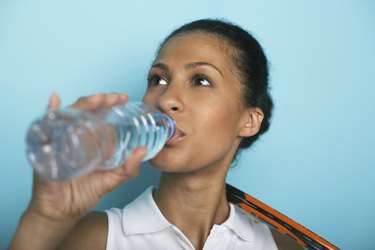
You might crave water for a variety of different reasons. It could just be a very hot day outside, and nothing but water will quench your thirst, or you could have a serious medical condition. If you begin to experience extreme cravings for water, see your doctor, who can eliminate various medical conditions and determine a proper diagnosis and whether something is wrong.
High Blood Pressure
Video of the Day
Diabetes means your blood sugar is higher than it should be because your body is unable to draw the glucose out of your blood and use it for fuel. One of the many warning signs that your glucose is too high is thirst. You might want to drink more water than usual, but this could be due to increased urination, which is another sign of diabetes. The more you urinate, the thirstier you will become. It's a vicious cycle, and you might feel as if you'll never get enough to drink. Keeping your diabetes under control can help combat the symptoms of high blood sugar.
Video of the Day
Dehydration
When your body loses too many fluids, you can become dehydrated. Dehydration leads to increased thirst, which might leave you craving more water than you normally drink. Your mouth might become sticky and dry. Drinking water can help alleviate the symptoms of dehydration and restore essential fluids back into your body. Other signs of dehydration include lack of sweating and tears, sunken eyes, extreme fatigue and decreased urine output. Typically, your body needs about 8 to 12 glasses of water daily, with each glass being 8 oz, according to BreastCancer.org. If you've been sick or are experiencing vomiting or diarrhea, your body needs more water than usual.
Kidney Complications
You might crave more water than usual if you're urinating a lot. Diabetes insipidus is a condition that affects your kidneys; it has nothing to do with blood sugar. Your body normally produces a certain amount of antidiuretic hormone, or ADH, which helps your kidneys determine how much fluid to eliminate from your body. If you have diabetes insipidus, your body releases excessive amounts of this hormone, which tells your body to urinate more frequently than it should. MedlinePlus notes that with this condition, your body might produce 100 to 500 oz. or more of urine each day. Your doctor can prescribe medications to help keep your ADH levels balanced so that your urine output isn't so high.
Too Much Salt
Salt, along with diuretics such as caffeine, can cause you to crave more water than usual, according to the National Kidney Foundation. Salt attracts water, which makes you thirstier. Canned foods, potato chips, frozen meals, smoked meats and luncheon meats all contain high amounts of sodium, or salt. Avoiding or limiting these foods can help your body absorb less fluid by decreasing your thirst.